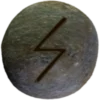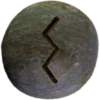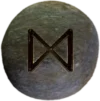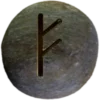Last Updated on March 23, 2025
Table of Contents




Symbolism and Meaning
Sowilō (pronounced “SOH-wee-loh”) represents the sun’s power, clarity, and life-giving energy. This rune, also spelled as Sowulo, Sōl, or Sigel, corresponds to the Proto-Germanic *sōl, meaning “sun.” It appears in both the Anglo-Saxon Futhorc as “Sigel” and the Younger Futhark as “Sól” (pronounced “SOHL”).
This rune embodies solar strength, guidance, and success. It represents the sun’s daily journey, which brings light and warmth. This rune connects to vitality, honor, and achieving one’s goals. Many associate it with a warrior’s strength and a leader’s vision. It also symbolizes personal power, confidence, and mental clarity.
Sowilō’s energy flows like the unbroken cycle of day and night. It encourages perseverance and unwavering determination. It also represents enlightenment, both in a spiritual and intellectual sense. Ancient traditions often linked the sun to divine wisdom and truth, making it a powerful symbol of revelation.
Historical Significance
The sun played a crucial role in ancient Germanic cultures. It marked time, aided navigation, and provided life. Many early Germanic people worshipped solar deities. Sowilō’s shape resembles a lightning bolt or a continuous zigzag, reinforcing its link to energy and motion. Some ancient carvings depict this rune alongside ships, possibly indicating safe voyages and divine favor.
In early Norse and Germanic traditions, the sun was associated with chariots or divine beings traveling across the sky. Some scholars connect Sowilō to Sunna, the Norse goddess of the sun, who drives her chariot across the heavens. Her presence ensured life and prosperity. The rune thus held a deep cultural and religious importance in many societies.
Use in Rune Poems
The Anglo-Saxon Rune Poem describes Sowilō as “the hope of seafarers,” guiding those who travel over the waves. The Old Norse Rune Poem and the Icelandic Rune Poem, while focused on the Younger Futhark, also highlight the sun’s importance. The sun represented a source of order in the cosmos, ensuring life flourished across the land and seas. ![]()
Sowilō in Daily Life and Magic
Ancient peoples may have inscribed Sowilō onto tools, weapons, and protective charms. It served as a beacon of success and protection. Warriors might have carved it onto their swords or shields, seeking divine favor in battle. Farmers could have invoked its power to bring sunlight for their crops.
Modern practitioners of rune magic use Sowilō for clarity, energy, and confidence. It enhances focus and helps individuals break through obstacles. In meditative practices, visualizing this rune can inspire motivation and clear vision. Many also use it in solar-based rituals, drawing strength from the sun’s radiant power.
Runes Related to Sowilō
Kenaz (pronounced “KAY-nahz”) represents fire, illumination, and transformation. Like Sowilō, it connects to light but in a different way. Kenaz embodies the torch rather than the sun, offering controlled fire and knowledge. It symbolizes learning, craftsmanship, and creative insight.
Dagaz (pronounced “DAH-gahz”) signifies daylight and new beginnings. It represents the moment of sunrise, bridging darkness and light. This rune shares Sowilō’s connection to illumination and awakening. Where Sowilō provides steady solar energy, Dagaz marks transformation and breakthrough moments. ![]()
Its Power in Asatru
Sowilō carries deep meaning for Asatruar. It represents personal power, success, and enlightenment. Many see it as Odin’s wisdom shining upon those who seek truth. The rune’s connection to victory also links it to warrior ideals and noble strength.
Some Asatruar use Sowilō in rune magic for clarity and guidance. It appears in bind-runes for success and in personal meditations for inner light. The sun’s life-giving force reminds practitioners of their duty to grow and persevere.
In modern practice, Sowilō often represents the triumph of wisdom over ignorance. It encourages those who follow the old ways to stand strong and walk their chosen path with confidence.


